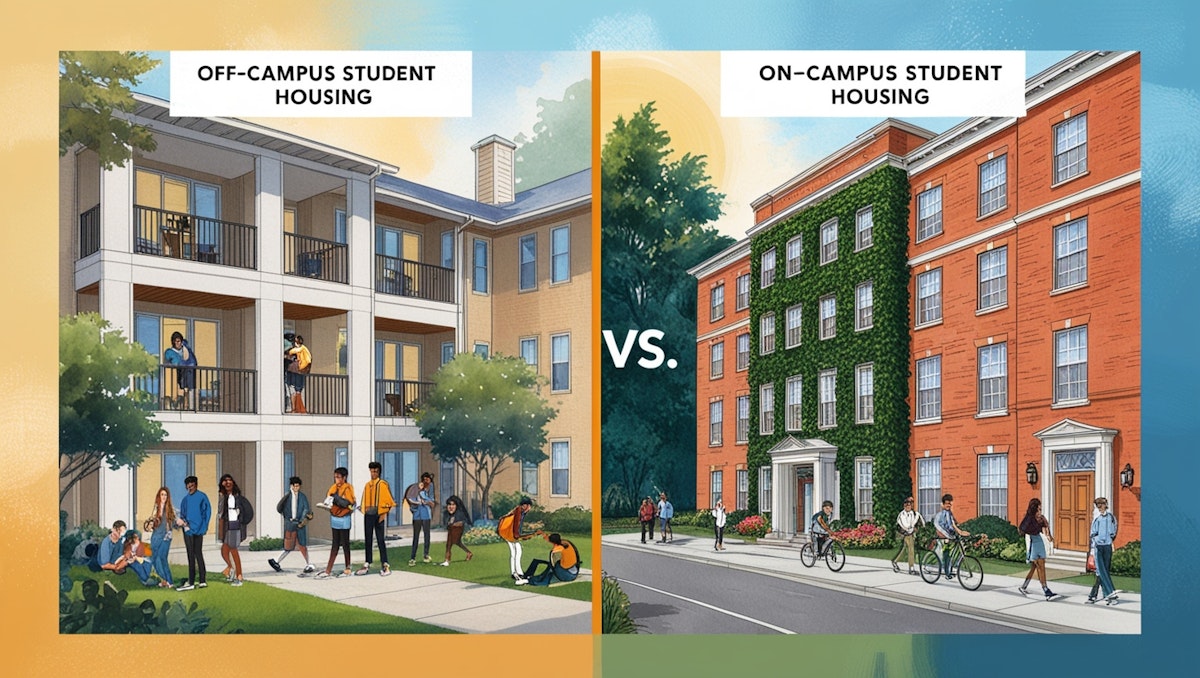Off campus student housing vs. On campus student housing: Which one is right for you?

Choosing the right accommodation is a pivotal decision for students embarking on their educational journey abroad. Both on-campus and off-campus student housing present unique advantages and challenges. This article aims to elucidate these aspects, assisting you in making an informed choice that aligns with your personal and academic needs.
Understanding On-Campus Student Housing
What Is On-Campus Student Housing?
On-campus housing refers to accommodations provided directly by the university, typically situated within or adjacent to the campus premises. These accommodations often include dormitories, university halls, and shared apartments, designed to foster a communal living environment among students.
Pros of On-Campus Housing
Convenience: Proximity to classes, libraries, and other campus facilities minimizes commute times, allowing for a more integrated academic experience.
Community & Social Life: Living among peers facilitates social interactions, making it easier to form friendships and engage in campus activities.
Safety & Security: Universities often provide 24/7 security within on-campus housing, ensuring a safe living environment for students.
All-Inclusive Costs: Utilities, internet, and other amenities are typically bundled into the housing fee, simplifying budgeting.
Cons of On-Campus Housing
Limited Space & Privacy: Shared rooms and communal facilities can restrict personal space and privacy.
Strict Rules & Regulations: Residents may be subject to curfews, visitor policies, and noise restrictions, limiting personal freedom.
Higher Costs in Some Cases: Some universities may charge rates higher than off-campus alternatives, impacting overall affordability.
Availability Issues: Limited slots can lead to waitlists, making it challenging to secure desired accommodations.
Understanding Off-Campus Student Housing
What Is Off-Campus Student Housing?
Off-campus student housing encompasses accommodations not directly affiliated with the university, such as private rentals, shared apartments, and purpose-built student accommodations (PBSA). These options offer a diverse range of living arrangements to suit varying preferences and budgets.
Pros of Off-Campus Housing
Greater Independence & Freedom: Living off-campus allows for a more autonomous lifestyle, free from institutional regulations.
More Privacy & Space: Students often have access to private rooms or entire apartments, enhancing personal space and comfort.
Variety of Options: A wide array of housing choices enables students to select accommodations that align with their specific needs and financial constraints.
Potential Cost Savings: Sharing off-campus housing with roommates can lead to significant cost reductions compared to some on-campus options.
Cons of Off-Campus Housing
Additional Responsibilities: Managing rent, utilities, and household chores requires a higher level of personal responsibility.
Distance from Campus: Depending on location, commuting to campus can be time-consuming and may incur additional transportation costs.
Security Concerns: Off-campus housing may not offer the same level of security as university-managed accommodations, necessitating careful evaluation of neighborhood safety.
Finding Reliable Accommodation: The onus is on the student to research and secure trustworthy housing, which can be a daunting task without proper guidance.
Key Factors to Consider When Choosing
Budget & Expenses
A comprehensive comparison of total costs—including rent, utilities, transportation, and food—is essential. While on-campus housing offers bundled expenses, off-campus student housing may provide opportunities for cost savings, especially when shared among roommates.
Lifestyle & Social Preferences
Consider how each housing option aligns with your social habits and desire for independence. On-campus housing fosters a community-centric environment, whereas off-campus living offers greater autonomy and privacy.
Commute & Accessibility
Evaluate the importance of proximity to campus facilities. While on-campus housing eliminates commute times, off-campus student housing may require daily travel, impacting your schedule and transportation budget.
Academic & Personal Needs
Reflect on how your living environment influences your study habits and overall well-being. Some students thrive in the bustling atmosphere of campus life, while others prefer the tranquility that off-campus housing can provide.
Final Verdict: Which One Is Right for You?
Both on-campus and off-campus student housing have distinct advantages and drawbacks. To explore a detailed on-campus vs. off-campus housing comparison, check out this guide for deeper insights Your choice should be guided by personal priorities, financial considerations, and lifestyle preferences. If you value convenience, community engagement, and structured support, on-campus housing may be the ideal choice. Conversely, if independence, privacy, and customizable living arrangements are paramount, off-campus housing could be more suitable.
Conclusion
The decision between on-campus and off-campus student housing is deeply personal and varies based on individual circumstances. It is advisable to consult university housing services, engage with current students, and explore all available options early to secure accommodation that best fits your needs. By carefully weighing the factors discussed, you can establish a living situation that enhances your academic journey and personal growth.
FAQs
Which is cheaper: on-campus or off-campus housing?
Costs vary. On-campus housing includes utilities, while off-campus can be cheaper if shared with roommates.Is off-campus housing safe?
It depends on location. Choose secure areas, check for safety features, or opt for PBSA for added security.Can I move off-campus mid-year?
Some universities allow it, but check your housing contract before making the switch.What challenges come with off-campus living?
Managing rent, utilities, commuting, and daily responsibilities requires more independence.How do I choose the best option?
Consider budget, lifestyle, commute, and academic needs. On-campus is convenient; off-campus offers more freedom.